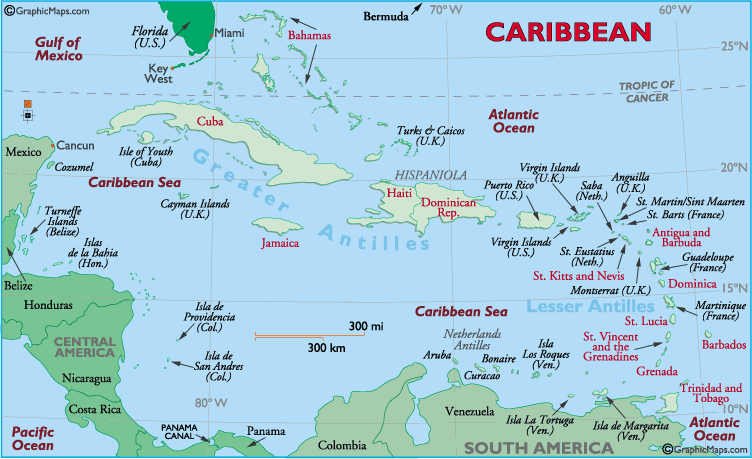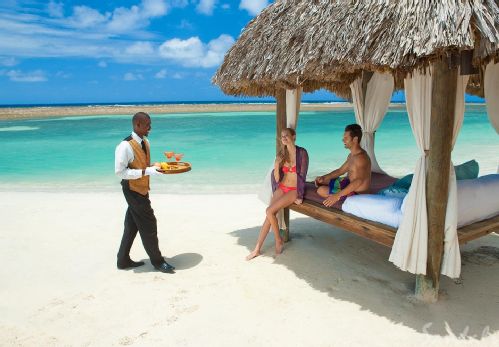Thinking about taking HI2E8-30?
This 30 CAT Second Year Modern option module is taught by Professor David Lambert. It previously used the module code AM217 and did not run in 2019-20.
The Caribbean is located ambiguously between Latin America and North America, and has strong and enduring historical links to Africa, Europe and Asia. We will learn about this diverse but often overlooked world region in the course of the module and discover its central place in the histories of empire, capitalism, race and globalisation from 1492 to the present. By the end, you'll be able to judge my claim that the Caribbean was crucial to the making of the modern world.

One of the ways in which we will study the history of the Caribbean on this module is through the critical analysis of visual material - a skill that you will serve you well more broadly. For example, think about the following image from the website of the Sandals hotel in Montego Bay, Jamaica. Is it just an innocent image designed to encourage tourists to stay here - or does it evoke troubling ideas of racial servitude, exotic consumption and colonial dispossession? We will think critically about the representation of the Caribbean and its inhabitants in HI2E8, including the unjust and sometimes violent histories with which such images are entwined.

Student reviews
Based on the formal feedback over the last 5 years, 100% of students agreed that they were satisfied with this module overall and over 90% ‘strongly’ agreed.
- ‘by far my best module for depth and interest’ - 2018-19 student
- ‘David gives suggestions for learning, which helps independent research and thinking about larger problems' - 2018-19 student’
- ‘Lectures r brill’ - 2018-19 student
- ‘David is amazing at explaining things’ - 2016-17 student
Aims and objectives
Since Europeans ‘discovered’ the islands, territories and peoples of the Caribbean in 1492, this region has been subjected to externally-directed processes of imperial rivalry, colonial settlement, the cultivation of plantation crops, land clearance leading to environmental degradation, and the extermination of the indigenous populations and the forced importation of millions of enslaved Africans and indentured labourers from Asia. This second-year option module offers an introduction to the history of the Caribbean and its place in the wider world. It will present key themes in Caribbean history, including slavery, the plantation, ‘race’ relations, emancipation and its aftermath, and resistance. Of particular concern will be how colonisation made the region’s societies dependent on other parts of the world, a dependency which survived both the ending of slavery and colonialism, and how efforts have been made to challenge and transcend this. The module will accomplish these objectives through addressing the historiography of the region, as well as readings from sociology, anthropology and geography. It will also provide experience of working with a variety of primary sources, including films, literature and, in particular, visual images.
You can view the module timetable here.
Learning outcomes
By the end of this module you should be able to:
- demonstrate enhanced study, writing and communication skills, in both written work and group discussion
- exhibit a capacity for independent study skills, clear/concise expression and critical analysis
- show a familiarity with key themes and debates in modern Caribbean history
- show some capacity to engage with historiographical debates relevant to the study of the Caribbean
Assessment
This 30 CAT Second Year Modern option module is assessed by...
- Oral participation/engagement (10%)
- 1500 word essay (10%)
- 3000 word essay (40%)
- 2 hour exam (40%)
You will be expected to play a central role in finding your own topic and sources, and coming up with a title, so start planning your assessed work early.
For detailed information about assessed work including deadline dates and submission instructions please refer to the Department Assessment and Submission webpages. Please note that this is a ‘Second Year Modern option’ module in terms of the timetable of assessments.
Suggested reading for new students
Before you start this module, I would encourage you to read the following short piece by Lillian Guerra on 'Why Caribbean History Matters'.
I would strongly recommend that you buy the following, neither of which is expensive. We will use the James book in a couple of seminars and it is a truly inspiring book:
- James, C. L. R., The Black Jacobins: Toussaint L’Ouverture and the San Domingo Revolution (London, 2001 Penguin edition; originally published 1938)
- Heuman, Gad, The Caribbean (London, 2006; 2014, second edition; 2018, third edition)
For other module readings, please see the core reading list.
